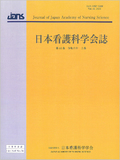Japanese
English
- 販売していません
- Abstract 文献概要
- 参考文献 Reference
要旨
目的:認知行動療法の理論に基づき,うつ病をもつ人が再休職に至った状況・認知・行動・感情・身体の変化を明らかにし,認知と行動の特徴に注目したアプローチを検討する.
方法:うつ病による再休職の経験をもつ8名の男性に対して半構造化インタビューを行った.得られたインタビューデータの分析はテーマティック・アナリシス法を用いた.
結果:うつ病をもつ人が再休職に至った認知は《理想の自分像への執着》《納得できるストーリー探し》であり,行動は《仕事の抱え込み》《我慢》《過去・未来・自分自身に関する反すう》であった.それらの認知と行動は,感情や身体へも影響し悪循環が生じていた.先行研究と比較し,対象者の特徴的な認知と行動は〈比較志向性の高さと極端な過小評価〉と《過去・未来・自分自身に関する反すう》であった.
結論:再休職を防ぐためには,客観的で正しい評価を得ることや,反すうへの対処が重要であると考えられた.
Objective: To clarify the cognitive, behavioral, emotional, and physical changes that lead to repeated sick leave in individuals with depression, based on cognitive-behavioral therapy theory, and to explore approaches focusing on these cognitive and behavioral characteristics.
Method: Semi-structured interviews were conducted with eight men who had taken repeated sick leave due to depression. The interview data were analyzed using thematic analysis.
Results: The key cognitive factors leading to repeated sick leave in individuals with depression were "attachment to an ideal self-image" and "searching for a reasonable story." Behavioral factors included "being overwhelmed with work," "endurance," and "ruminating about the past, future, and oneself." These cognitive and behavioral patterns also influenced emotions and the body system, creating a vicious circle. The participants' cognitions and behaviors were more characteristic than previous studies, particularly: "high-comparison orientation and extreme underestimation" and "rumination about the past, future, and oneself."
Conclusion: To prevent repeated sick leave, it is crucial to foster objective and correct evaluations and address rumination.
Copyright © 2024, Japan Academy of Nursing Science. All rights reserved.


